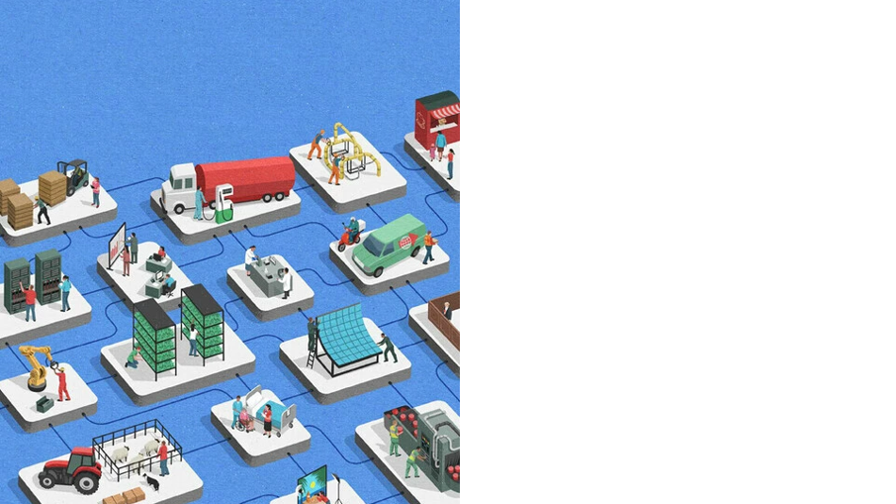As we approach the halfway point of 2025 in just a few coming weeks, the job market has also been significantly impacted already. Key drivers include 2025 workplace trends, future career outlooks, and evolving office models. Automation systems and processes powered by technology and software are increasingly replacing manual labor, while AI and the push for sustainability are transforming industries and creating new opportunities. Promising roles include advanced AI developers, green energy consultants, and cybersecurity specialists. The Future of Jobs Report 2025 by the World Economic Forum and the latest ManpowerGroup Employment Outlook Survey highlight the importance of adapting to these changes and embracing innovation to maintain competitiveness in the rapidly evolving job market.
Based on insights gathered by SCGC and an understanding of emerging trends, if you're someone looking for a job or considering a career change, you can develop essential skills aligned with future career opportunities and high-demand skills for 2025 and beyond. Key abilities include adaptability to handle change and uncertainty, critical thinking, and technical expertise. With these skills, you can navigate your career path effectively and make well-informed decisions in the ever-evolving professional landscape.
Work Trends and Future Jobs for Tomorrow’s Workforce
By 2030, future career opportunities and advancements in technology will have transformed the global labor market. According to the Future of Future of Jobs Report 2025, which surveyed over 1,000 employers across 22 industries and 55 economies worldwide, changes driven by AI, robotics, and energy systems are reshaping the workforce. One of the most impactful trends is the expansion of digital access, with 60% of employers predicting significant business model changes by 2030. Currently, high-growth roles such as AI developers, renewable energy engineers, and cybersecurity specialists are gaining popularity. Meanwhile, the demand for high-demand skills like big data analytics, technological expertise, and cybersecurity continues to rise steadily. These shifts emphasize the importance of adapting to rapid technological changes to ensure organizational success and career growth in the evolving job landscape.
The Jobs on the Rise Reporthighlights key trends in future jobs for 2025 and beyond, emphasizing the growing demand for both technology-related roles and jobs that focus on human-centric skills. Technology remains the fastest-growing industry globally, with positions such as AI engineers, cybersecurity specialists, and machine learning experts ranking among the most in-demand roles in countries like the United States, the United Kingdom, Singapore, and the Netherlands. These insights underscore the importance of equipping oneself with high-demand skills to thrive in the evolving global job market.
The global labor market is undergoing significant transformation, driven by the shift toward sustainability and demographic changes. Careers focused on sustainability are rapidly rising, with roles such as renewable energy engineers, environmental engineers, and electric/automated vehicle specialists becoming highly sought-after in the global job market. Addressing climate change has emerged as one of the most impactful career trends, emphasizing the need for professionals skilled in sustainability. Simultaneously, the aging population in high-income countries is increasing demand for healthcare professionals like nurses, while the growing working-age population in low-income countries is driving demand for education-related roles, such as higher education instructors. Europe is leading the way in creating sustainability-focused jobs, with countries like the Netherlands showing notable growth in roles such as sustainability specialists and energy consultants. As sustainability, innovation, and societal needs reshape the job market, 2025 and the future present abundant future career opportunities across diverse fields. For those looking to align their goals with global job market trends, this is the perfect time to develop high-demand skills and explore future jobs that will thrive in the evolving workforce.
In the post-COVID-19 world, the tourism and hospitality industries are experiencing a resurgence, creating exciting future career opportunities in various regions. Roles such as travel consultants, aircraft mechanics, and food and beverage supervisors are seeing significant growth in countries like Spain, Indonesia, and Canada. As these sectors recover and expand, they offer promising future jobs for individuals equipped with high-demand skills tailored to the evolving needs of these industries.
High-demand Skills for Tomorrow’s Workforce
Offices worldwide are undergoing rapid transformation, driven by key trends such as the adoption of AI, multi-generational team collaboration, and skill instability—a phenomenon where professional skills evolve and become obsolete more quickly in today's dynamic world. The Work Change Report reveals that individuals with specialized skills are now twice as likely to change jobs during their careers compared to 15 years ago. AI is accelerating changes in skill demand and workplace efficiency, with predictions indicating that 39% of the skills used by workers today will become outdated by 2030. This highlights the critical need for lifelong learning and the development of new high-demand skills. Core competencies such as analytical thinking, resilience, adaptability, and leadership remain essential in 2025, while rapidly growing skills like creative thinking and curiosity complement technology-related expertise in areas like AI and big data. Interestingly, businesses leveraging generative AI have reported increased revenues, demonstrating its significant impact on future career opportunities.
These changes signal the importance of readiness and adaptability across the value chain to thrive in this era of innovation and sustainability. As the world evolves, embracing new skills and aligning with emerging trends will be key to achieving success in both the present and the future workforce.
The convergence of two critical agendas—sustainability and innovation—continues to drive the growth of the global job market in 2025 and beyond, shaping future jobs. Roles related to sustainability, such as sustainability specialists, environmental officers, and energy consultants, are in high demand as businesses increasingly prioritize addressing climate change. At the same time, the integration of AI is creating new opportunities across various industries, with 88% of C-suite executives focusing on incorporating AI within the next year and into the future. This transformation underscores the growing necessity for reskilling, as more than half of the workforce has already participated in training programs to prepare for shifting demands. As the need for manual and precision-based skills declines, individuals who embrace creative thinking, adaptability, and technological expertise will find themselves well-positioned to thrive in the rapidly evolving labor market. Developing high-demand skills aligned with these trends will be essential for success in this dynamic and innovative professional landscape.
Tomorrow’s Workforce: What Else We Should Know About?
This year and beyond, remote work, commonly referred to as Work From Home, which was once considered a standard benefit for employees, is showing signs of decline. Many companies are shifting back to in-office or hybrid work models. Fully remote positions are becoming less common and increasingly competitive, leading to heightened demand for these roles. For individuals working remotely, it’s essential to focus on delivering measurable results, maintaining discipline, and communicating effectively with team members to demonstrate the value of their work. Meanwhile, job seekers should be open to hybrid opportunities that may require occasional in-office presence, emphasizing their ability to perform well in both remote and office environments. This shift underscores the importance of adaptability and resilience as workplace trends continue to evolve. Developing high-demand skills such as effective communication, self-management, and collaboration will be crucial for navigating these changes and exploring future career opportunities in the dynamic professional landscape.
In the context of work trends in 2025 and future career opportunities, high-growth roles in advanced technology fields such as AI, machine learning, and software development are placing greater emphasis on practical experience over traditional education. While degrees still hold value, most organizations today prioritize real-world experience. As a result, portfolios, training certifications, and completed projects have become essential for job seekers in this era and the future workforce. Similarly, traditional cover letters are becoming less significant, with HR professionals now focusing on tangible evidence of skills, such as work samples, case studies, and personal websites. To stand out, you should prioritize building a portfolio that showcases your achievements and problem-solving capabilities, aligning with the increasing demand for high-demand skills in the modern and future job market. By adapting to these evolving expectations, individuals can better position themselves for success in future jobs and thrive in a rapidly changing professional landscape.

For office trends in 2025 and the evolving landscape of future jobs, workplaces are shifting toward promoting internal talent and leveraging network-based job referrals. As companies streamline hiring processes and focus on their existing workforce, building strong internal networks through collaboration and relationship-building has become essential for career advancement. Externally, referrals via LinkedIn and interactions with professionals in the same field have gained more value than ever, highlighting the importance of keeping your profile updated and engaging meaningfully with others in your industry. While layoffs are expected to decrease, hiring disruptions may become more frequent due to economic uncertainties. Job seekers should prioritize developing high-demand skills, earning certifications, and exploring freelance opportunities to stay competitive during hiring slowdowns. These strategies align with the increasing emphasis on sustainability and innovation as key drivers of career growth. The future career opportunities of 2025 and beyond are reshaping industries, propelled by automation, sustainability, and innovation, creating a dynamic professional environment for those prepared to adapt and thrive.
The work trends in 2025 and future career opportunities are shaping industries driven by innovation and sustainability. High-demand roles related to AI, green energy, and cybersecurity emphasize the need for job seekers and career changers to adapt quickly and learn how to utilize emerging technologies. Meanwhile, offices are increasingly prioritizing alignment with new technologies and sustainability practices to maintain competitiveness. Insights from key reports, such as the Future of Jobs Report 2025 by the World Economic Forum and the ManpowerGroup Employment Outlook Survey, highlight the importance of developing strategic high-demand skills to thrive in this shifting landscape. By embracing innovation and understanding these trends, individuals can seize future jobs and build sustainable career paths that align with the evolving global workforce. This proactive approach ensures success in navigating the dynamic and forward-looking professional environment.
Join our team at SCGC and help create sustainable plastic innovation and materials solutions for our World and society. Apply https://career.scg.com/
___________________________________
References and image credits:











